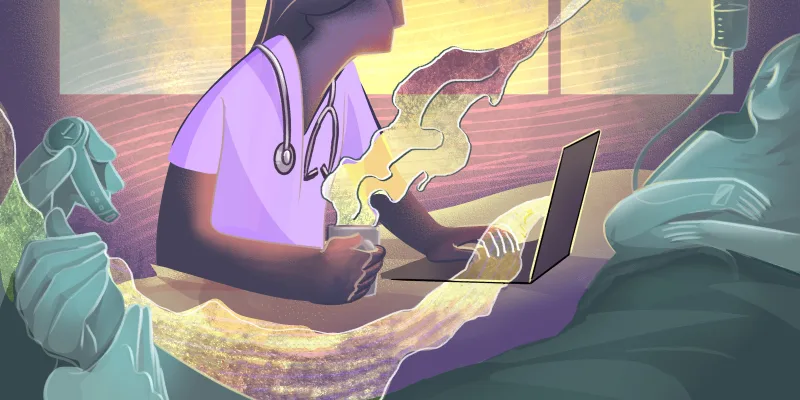
A clinician’s job is to heal and to improve the lives of others. For most, the healing is done in a medical setting. But for a large group of healthcare professionals, the work doesn’t stop when they leave the exam room. Some are taking the fight for bettering their patients’ lives all the way to Congress.
In today’s highly politically-charged society, clinician advocates are championing a variety of causes, from patient literacy, to healthcare access for all, to gun control, to racial and gender equality, to better social services, and beyond. But an echoed sentiment amongst clinician-advocates is the feeling that they are making a positive difference in the lives of all patients, not just their own.
For Dr. Jane Zhu, who works to change policy to improve access to high-quality care, advocating isn’t just something she feels she should do out of the goodness of her heart — she considers it part of her job as a clinician.
“Part of our responsibility as physicians is to participate in activities that contribute to the betterment of public health,” Dr. Zhu says. “Patients aren’t just at the center of our clinical activities; part of professionalism in medicine is that patients should also be a focus of our public-facing activities.”
Dr. Zhu advocates for a society where all patients can get access to high-quality care, something that Dr. Mark Ryan also fights for.
Dr. Ryan wants healthcare to be available to as many people as possible, so he focuses on equity, access, and expansion of healthcare coverage, which coincides with the mission of the clinic where he works. It’s a safety net clinic, which provides healthcare to those who would otherwise not have easily-available services.
“So if anything,” Dr. Ryan says, “the advocacy fits directly into the kind of work that I do.” Though sometimes Dr. Ryan may take a stronger position than his health system, he generally doesn’t come up against too much friction.
While many clinicians may advocate for something that aligns closely with their job or specialty (and therefore doesn’t create much of a stir), Dr. Eugene Gu falls into a different category. Believing healthcare to be a right, he advocates for equality and against injustice since he himself has been in situations in which he felt discriminated against.
After being the victim of a racially-motivated attack in his institution’s parking garage while in his hospital uniform, Dr. Gu became especially outspoken for justice and equality.
“To me, [equality] is related to healthcare as doctors because our job is to protect people at their most vulnerable moments in their life, when they’re sick. By extension, it would only make sense if we care about everyone in our society who’s vulnerable, because that’s part of our job description,” Dr. Gu says.
Dr. Nathan Chomilo, who advocates for health literacy as a stepping stone for improving health equity, lives by a similar creed: speaking out for patients is just part of the job.
“Advocacy is an extension of caring for my patients,” says Dr. Chomilo. “Seeing the impact possible when I am able to translate the impact of legislation on my patients’ lives and how we can be a force for real change helps me put in perspective the day-to-day grind of patient care that can drain you if you lack that [perspective].”
Using their position of power to make that impact on society and legislation is an obligation of clinicians, says Dr. Alice Chen. She advocates for a compassionate society, along with supporting the ACA, policies to reduce gun violence, and a strong social safety net.
Because of their degrees and titles, Dr. Chen says that clinicians have an even greater responsibility to speak up because they have a larger platform.
“For better or for worse, wearing a white coat means I have a louder voice in society than my patients,” Dr. Chen says. “It is a natural extension of my role as a doctor to advocate for laws and policies that address the real world problems that my patients face.”
And if clinicians aren’t the ones speaking up, Dr. Ryan says, they can be sure that someone else is, and that person may be speaking against them.
“It’s important for physicians to have their voice in the discussions that are happening at the policy level, across all areas. If we are not having those conversations, if we’re not in those discussions, we can rest assured that someone else is,” Dr. Ryan says. “And if we aren’t pushing for our values, our beliefs and our priorities, then others may be advocating against us in a different direction.”
This type of advocacy — raising your voice and taking part in discussions — is only one of the ways to champion causes, says Dr. Zhu.
“Advocacy means different things to different people — it’s not always marching on the streets. Advocacy is also disseminating sound evidence and translating science to legislators and the public in order to inform robust policies,” Dr. Zhu says. “So, sometimes your role in advocacy is to conduct good science and make sure it reaches the right audiences accurately. Sometimes it means directly advocating for patients by speaking to insurance companies to get their procedures or medications covered. And sometimes it involves writing op-eds in local papers and adding your voice to public debates about health and healthcare-related issues.”
Other ways to get involved? Dr. Ryan says a phone call is the best way to be heard. Dr. Chomilo likes Facebook because it’s a “way to connect with your patients and share your views in a manner that doesn’t take advantage of the power dynamic found in clinics and hospital settings.” But one thing clinician advocates agree on is the power of using Twitter as a platform.
No matter what a clinician advocates for or how they go about it, at the end of the day, Dr. Chen says that the most important thing about being an advocate is simply speaking up.
“The truth is,” says Dr. Chen, “in a messy democracy where there are a hundred competing priorities, the voices that are raised are the ones that are heard.”







